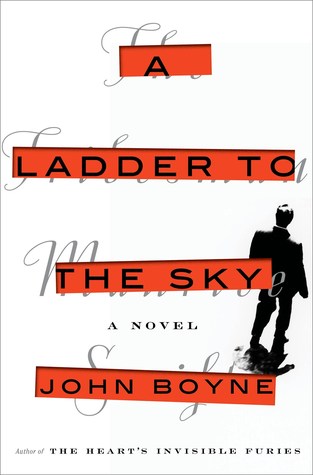“And you’ve heard the old proverb about ambition, haven’t you?”
He shook his head.
“That it’s like setting a ladder to the sky. A pointless waste of energy.”
A coworker at the bookstore asked me the other day if I had read A Ladder to the Sky yet – she knew that we had both been sent ARCs last fall – and when I said I had never read any of John Boyne before, she said this is where I had to start. She, a retired schoolteacher who doesn't tend to talk this way, explained, “I started it the other night and couldn't put it down until I was done. The main character is just such a dick. Such a complete and unrepentant dick that I had to keep reading to see what he would do next.” And then after explaining some of the plot and the interesting literary devices that Boyne employs, I agreed that it sounded compelling and I started this book the next day. And she was right about all of it – plot, characters, meta-narrative about the literary world, intriguing POV shifts, but most of all, our love-to-hate protagonist Maurice Swift – all of it kept me fascinated and horrified until the final, perfect, endscene. I'll definitely be reading some more John Boyne, and in fairness to the surprises in this story, put the rest of this review behind spoiler tags.
“I want to be a success,” he replied, and perhaps I should have heard the deep intent in his tone and been frightened by it. “It's all that matters to me. I'll do whatever it takes to succeed.”**spoilers**: I took an online Creative Writing course a few years ago – because it was free and I had too much time on my hands – and after the instructor (a published author of juvenile detective fiction) walked us through his “foolproof plotting method” (a totally paint-by-numbers framework), he asked us to come up with the plot for a novel, sketch out all the details using his method, and upload the results for group feedback. Now, I am never going to write a novel, but I asked on the forum if it wasn't a little risky to share these ideas with a group of strangers – what if someone had a totally unique plot idea and it got poached? – and the instructor's response was pretty snarky: There's no such thing as a unique storyline, professional writers workshop together all the time, and besides, if he gave us all the plot to Animal Farm, one of us would have to be George Orwell to make art of it. And this is pretty much what A Ladder to the Sky is about (even the same Animal Farm/Orwell point is made; this must be the go-to example among established writers): an ambitious young author – someone with an undeniable gift for writing but no imagination for storylines – will do whatever it takes to become a success. Because Maurice Swift is incredibly handsome, he can manipulate anyone with his charms; and because he doesn't seem to have a conscience, he feels absolutely no remorse about beguiling, stealing, or adapting other writers' stories away from them – after all, he actually can can write better than any of them; what's the harm in sending art out into the world?
“It's not as if anyone could just take someone else's story and write it themselves, is it? These things need to form in a writer's mind over time. After all, a novel is about a lot more than just plot, right?”Even with a spoiler warning, I'm reluctant to give away more details about this plot, but I would like to memorialise a few things: I find it interesting that all of the passages I had marked to quote were of dialogue, which never happens, so that strikes me as notable; I really liked the use of shifting points of view – we first meet Maurice through someone else's first person POV, move on to a passage from the third person (which sees Maurice meet, and fail to con, Gore Vidal), then it's a second person POV from his wife's perspective (who reminded me of Zadie Smith, perhaps intentionally; likely even more talented than Maurice, but he steals from her, too, in a terrible way), then a more detached third person POV as we see Maurice at a professionally mature time of life, and conclude from his first person perspective in his older years – none of that shifting should work for me, but it really does; I tend to find it cutesy when authors talk about the literary world, but the scrabbling and jealousies and seductions in this portrayal were totally fun; and ultimately, I loved that Maurice never grew as a person – he knew what he wanted from the time he was a boy, and he unapologetically went after it. And if Maurice can spin gold out of lesser writers' dross, even if people die along the way, doesn't he owe it to the art world to be a “complete an unrepentant dick”? (Yeah, I don't actually think so either, but it makes for excellent reading.)
“Right,” I said, wondering how many of my peers would argue with that notion. “So, what you're saying is that if someone did do that, they'd have to be...what? Actually, what are you saying?”
“Well, they'd have to be really talented,” he said. “But also a complete psychopath.”
I laughed. “Well, yes. But, of course, those two things aren't mutually exclusive.”

